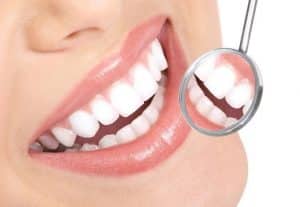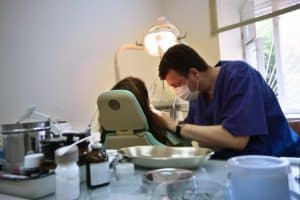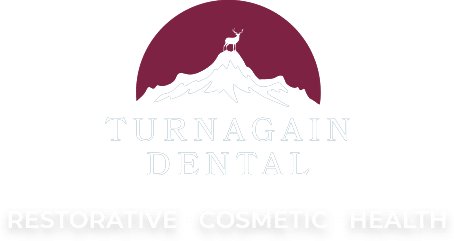 Want to restore your bite with a dental crown in Anchorage? Dental crowns are one of the best (if not the best) way to prolong the life of a damaged, fractured or decayed tooth. Also known as caps, crowns recreate the entire 360-degree exterior of a healthy tooth. Placing a dental crown over a compromised tooth provides strength and support and protects it from additional damage.
Want to restore your bite with a dental crown in Anchorage? Dental crowns are one of the best (if not the best) way to prolong the life of a damaged, fractured or decayed tooth. Also known as caps, crowns recreate the entire 360-degree exterior of a healthy tooth. Placing a dental crown over a compromised tooth provides strength and support and protects it from additional damage.
Quality crowns are carefully designed and handcrafted to fit your exact bite. Successful treatment with crowns requires the skill of an extraordinary cosmetic and restorative dentist. Dr. Kennedy of Turnagain Dental will review all of your options with you, explaining the pros and cons of each, before recommending treatment with crowns. He will take the time to educate you about different crown materials, including tooth-colored and metal crowns, and help you select the perfect fit for your particular needs. More and more patients are opting for tooth-colored crowns because they are designed to blend in with the surrounding natural teeth.
Why Do I Need a Dental Crown?
You may need a dental crown if you have a broken or cracked tooth, perhaps from an accident, trauma or years of use. Crowns cover and protect jeopardized teeth to lower the risk of additional damage or deterioration. Small cracks can worsen if left untreated, causing additional damage that is more difficult to treat; therefore, it’s important to have a small crack looked at and treated quickly to avoid problems in the future.
Another reason why you may need a dental crown is if you have tooth decay that is too extensive for a filling. If a substantial portion of your tooth is decayed, crowns are a better option than a filling because they offer better protection. Also, large fillings weaken the tooth and could cause the tooth to break, so it’s usually better to take a proactive approach and place a strong, durable crown.
Crowns are also used to top dental implants and anchor dental bridges. Traditional bridges are constructed from two crowns bookending an artificial tooth. If you have a gap left by a missing tooth (or teeth), the natural teeth surrounding the gap will be crowned and the artificial tooth will fill the gap.
Finally, if you need a root canal, a crown will be placed over the affected tooth to protect it from further damage.
Placing a Dental Crown
 Traditional dental crowns require two or more visits for design and delivery.
Traditional dental crowns require two or more visits for design and delivery.
At the first visit, Dr. Kennedy must remove a small amount of natural tooth structure (including any decay) to make room to fit the crown over the surface of the tooth. Impressions will be made of the affected tooth and used to design the crown so it fits snugly. Dr. Kennedy can place a provisional crown over the prepared tooth to protect it while the definitive restoration is being constructed.
Once the dental laboratory has fabricated the custom crown, the second visit takes place. Dr. Kennedy removes the temporary crown and positions the definitive crown over the affected tooth. He checks its fit as well as the bite. Finally, he bonds or cements the dental crown into place and finishes by polishing it.
A crown can last for many, many years, depending on the material, where in the mouth it is placed and how you maintain your crown. Dr. Kennedy will provide you with detailed instructions for caring for your new crown and preventing any damage. With the proper care, you can enjoy your crown for years to come.
Types of Dental Crowns
All dental crowns are made of strong, durable materials. The three main types of materials used to create crowns are:
Metal
In years past, gold and other similar metals were the only options available for dental crowns and other dental restorations. Although not the most aesthetically pleasing option, metal crowns offer a great deal of support to the remaining tooth structure and are highly durable. There is no risk for cracking, fracturing or chipping with metal crowns. They may be an appropriate option for patients who desire predictability and/or who grind their teeth or need to repair or replace the molars (the teeth located in the back of the mouth), which are susceptible to more wear and tear than the front teeth.
All-Ceramic or All-Porcelain
All-ceramic and all-porcelain dental crowns are popular because they closely resemble the look of natural tooth enamel. They are beautiful. When in place, these crowns blend in seamlessly with the surrounding teeth. While modern ceramic and porcelain crowns are stronger and more durable than ever before, patients should take steps to protect their restorations. Avoid clenching and grinding your teeth, and biting down on hard objects and foods that can potentially crack or chip your all-porcelain or all-ceramic crown.
Porcelain-Fused-to-Metal
Porcelain-fused-to-metal crowns offer the strength and durability of metal crowns and the attractiveness of all-porcelain crowns. Be advised that porcelain-fused-to-metal crowns may show the underlying metal or gold margin at the gum line as it recedes over time.
Dental Crowns FAQs
How do I choose the right dental crown?
The best type of dental crown for you depends on your dental needs and preferences. Dr. Kennedy will discuss your options in detail with you, including the advantages and disadvantages of each crown, and help you choose the option that’s best for you.
How do I take care of my dental crown?
In addition to brushing and flossing your teeth, and visiting Dr. Kennedy for six-month dental checkups, you should avoid smoking, grinding your teeth and biting or chewing on hard objects (e.g., ice, bottle caps).
Will I be able to feel the difference between my crown and natural teeth once the crown is in place?
As long as the crown is designed and placed by an experienced dentist like Dr. Kennedy, you should not be able to feel the difference between the dental crown and your natural teeth. Dr. Kennedy uses the most advanced dental technologies to obtain specific measurements of your tooth and mouth, as well as to plan the precise placement of the crown. This ensures a snug yet comfortable fit that will not interfere with your ability to eat, speak or chew normally.
How much do dental crowns cost?
The cost of dental crowns in Anchorage will vary based on several factors, including the material of the crown and the details of the procedure (i.e., whether a dental bridge or implant is also needed). Depending on the details of your insurance coverage, your dental plan may cover all or a portion of the cost of your dental crown. Dr. Kennedy offers affordable financing with CareCredit, which can help you pay for your dental crown via low monthly payments. Speak to a member of our team to learn more about the payment options we offer.
Learn More about Dental Crowns
If you would like more information about dental crowns, including what they are used for and how they are placed, Dr. Kennedy welcomes you to contact Turnagain Dental and request an appointment.
